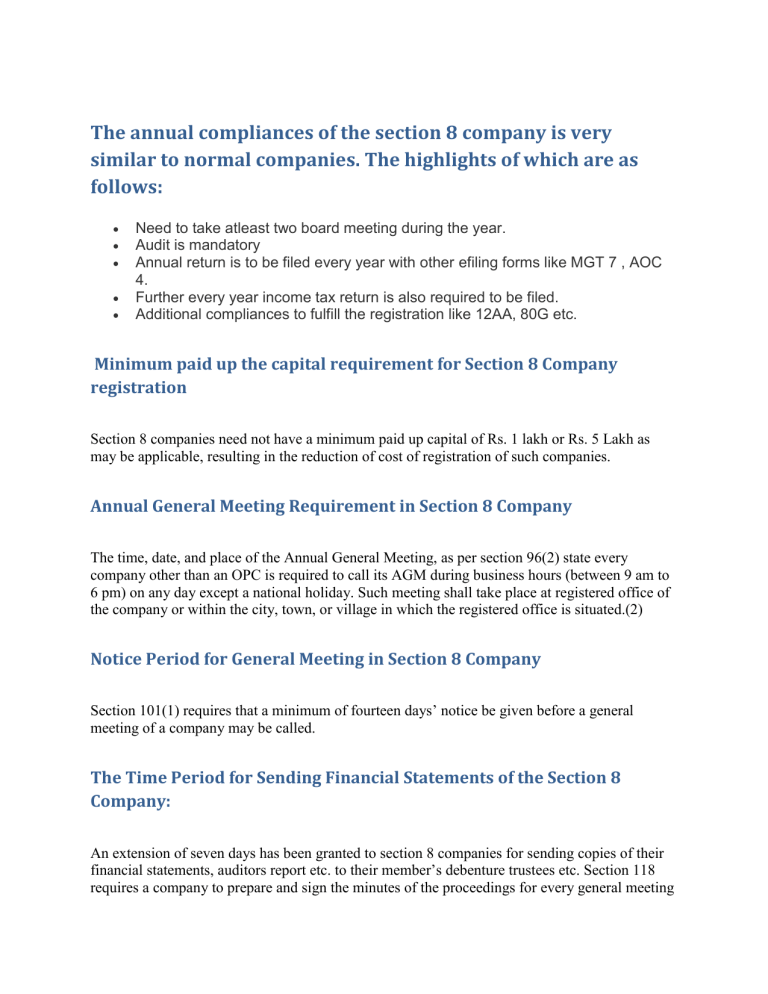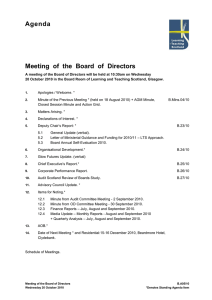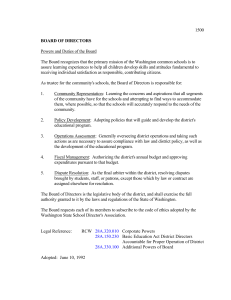
The annual compliances of the section 8 company is very similar to normal companies. The highlights of which are as follows: Need to take atleast two board meeting during the year. Audit is mandatory Annual return is to be filed every year with other efiling forms like MGT 7 , AOC 4. Further every year income tax return is also required to be filed. Additional compliances to fulfill the registration like 12AA, 80G etc. Minimum paid up the capital requirement for Section 8 Company registration Section 8 companies need not have a minimum paid up capital of Rs. 1 lakh or Rs. 5 Lakh as may be applicable, resulting in the reduction of cost of registration of such companies. Annual General Meeting Requirement in Section 8 Company The time, date, and place of the Annual General Meeting, as per section 96(2) state every company other than an OPC is required to call its AGM during business hours (between 9 am to 6 pm) on any day except a national holiday. Such meeting shall take place at registered office of the company or within the city, town, or village in which the registered office is situated.(2) Notice Period for General Meeting in Section 8 Company Section 101(1) requires that a minimum of fourteen days’ notice be given before a general meeting of a company may be called. The Time Period for Sending Financial Statements of the Section 8 Company: An extension of seven days has been granted to section 8 companies for sending copies of their financial statements, auditors report etc. to their member’s debenture trustees etc. Section 118 requires a company to prepare and sign the minutes of the proceedings for every general meeting of shareholders or creditors within 30 days from the conclusion of such a meeting. It requires the minutes from AGM’s be consecutively numbered. It further details what should and should not be included in the minutes, in addition to the punishment for tampering with minutes to their member’s debenture trustees etc. Minutes of Proceedings from Meetings: A relaxation from section 118 has been provided to section 8 companies, except where the AOA of such a company contains a provision for confirmation of minutes by circulation. Hence no provision of section 118 relating to minutes of proceedings from general board meetings etc. shall apply to section 8 companies, except where its AOA contains a provision that minutes have to be confirmed by circulation. Appointment of Director in Section 8 Company Section 8 Company can now appoint any number of directors. There is no minimum requirement nor a restriction of a maximum number of directors that can be appointed by such companies. Also, a special resolution is not needed for appointing more than 15 directors. As per the notification subsections (4) to (11), 12 (i) and (13) of section 149, section 150 and proviso to section 152(5), this section has been amended to change the quorum requirement for Section 8 companies to either 8 directors or 25% of the total strength, whichever is lower. Powers of Board in a Section 8 Company The powers of the board under clauses (d), (e) and (f) of section 179(3) may be exercised by the board of Section 8 companies by circulation instead of a meeting. Hence, the directors may exercise these powers by passing resolutions through circulation instead of a meeting. These powers include borrowing money, investing the funds from the company, granting loans, or giving a guarantee and providing security in respect to loans. Audit Committee: The audit committee of a section 8 company need not have independent directors forming a majority. Nomination and Remuneration Committee and Stakeholder’s Relationship Committee: Section 178 shall not apply to Section 8 companies. Thus section 8 companies are not required to form any of the above-mentioned committees. Related Party Transactions: This section shall apply to section 8 company only with reference to transactions under section 188 exceeding Rs. 1 lakh. Hence every director of a Section 8 company shall disclose the nature of his concern or interest at a board meeting if the related party transaction exceeds Rs. 1 lakh, and he shall not participate in such a meeting.



